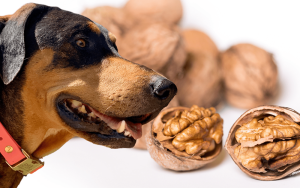can dogs eat grapes

Introduction
When it comes to treating our dogs, it’s easy to assume that the same foods we enjoy are safe for them as well. Grapes, for example, are a delicious, healthy snack for humans, but can dogs eat grapes safely? The answer might surprise you, as grapes pose
a serious health risk to dogs. In this comprehensive guide, we’ll dive into the science behind why grapes are dangerous for dogs, explore the symptoms of poisoning, and offer alternatives to ensure your pet stays healthy and happy.
If you’re a dog owner, understanding which foods are safe and which ones to avoid is crucial to your pet’s well-being. In this article, we’ll provide you with the essential knowledge to keep your dog safe, as well as practical tips for managing their
diet.
Can Dogs Eat Grapes?
The short answer is no, dogs should not eat grapes or raisins (dried grapes). While it’s not fully understood why grapes cause toxicity in dogs, even small amounts can lead to severe health complications, including kidney failure. Some
dogs seem to be more sensitive to grapes than others, but the risk is still significant enough to avoid giving them to your pet altogether.
Why Are Grapes Dangerous for Dogs?
Despite being a healthy snack for humans, grapes (and raisins) are toxic to dogs. The exact mechanism behind this toxicity is not entirely understood, but it’s clear that they can cause severe kidney damage. Here are some key reasons why grapes are harmful
to dogs:
-
Kidney Failure: The most significant risk associated with grapes is acute kidney failure. Grapes and raisins can cause a rapid decline in kidney function, leading to symptoms such as vomiting, diarrhea, and lethargy. If left untreated,
kidney failure can be fatal. -
Inconsistent Toxicity: Not all dogs who eat grapes will experience toxicity, and the amount needed to cause harm varies widely. Some dogs may consume grapes without showing any immediate symptoms, while others can develop severe
reactions from ingesting only a small amount. This inconsistency makes it difficult for dog owners to gauge the level of risk. -
Unknown Toxic Compound: Despite extensive research, scientists have not identified a specific toxin in grapes that causes kidney failure in dogs. This makes it even more difficult to assess how grapes affect dogs and why some
may react differently. -
Delayed Symptoms: After ingestion, symptoms of grape or raisin poisoning can be delayed for several hours, making it challenging for dog owners to connect the cause with the symptoms. Early intervention is essential for the best
chance of recovery.
Symptoms of Grape or Raisin Poisoning in Dogs
If your dog has ingested grapes or raisins, it’s crucial to watch for signs of toxicity and seek immediate veterinary care. Symptoms can vary but often include:
- Vomiting: One of the earliest signs of grape poisoning is vomiting, typically within hours of ingestion.
- Diarrhea: Diarrhea often follows vomiting, indicating digestive distress.
- Lethargy: A dog who has ingested grapes may appear unusually tired or weak and may not be as energetic as usual.
- Loss of Appetite: Dogs affected by grape toxicity often lose their appetite and may refuse to eat.
- Dehydration: Vomiting and diarrhea can lead to dehydration, which can worsen the overall condition.
- Abdominal Pain: Some dogs experience pain or discomfort in the abdominal area.
- Increased or Decreased Urination: Kidney damage from grape poisoning can affect a dog’s ability to urinate normally. Some dogs may urinate excessively, while others may stop urinating altogether, which is a serious sign of kidney
failure. - Bad Breath (Uremic Breath): If kidney failure progresses, a dog’s breath may develop a distinct, ammonia-like odor.
What to Do If Your Dog Eats Grapes
If you suspect your dog has eaten grapes or raisins, take immediate action:
-
Contact Your Veterinarian: The first step is to call your vet. If it’s after hours, most areas have an emergency veterinary clinic available. Provide details about the amount of grapes ingested and your dog’s symptoms.
-
Induce Vomiting (if advised by a veterinarian): If the ingestion was recent, your veterinarian may recommend inducing vomiting to prevent further absorption of toxins. This must only be done under professional supervision, as
improper procedures can lead to additional health risks. -
Visit the Vet for Treatment: Your dog may need intravenous fluids to prevent dehydration and support kidney function. In some cases, activated charcoal may be administered to absorb any remaining toxins in the stomach. Blood tests
and monitoring of kidney function will also be necessary. -
Hospitalization for Severe Cases: In severe cases, where kidney failure has already begun to set in, your dog may need to be hospitalized for more intensive care, including dialysis and other advanced treatments.
Preventing Grape Poisoning
The best way to prevent grape poisoning is to be vigilant and proactive. Here are some tips to keep your dog safe from the dangers of grapes:
-
Keep Grapes Out of Reach: Store grapes, raisins, and any other toxic foods in places that are inaccessible to your dog. Make sure that your trash is securely closed and that no food scraps are left out.
-
Educate Family and Friends: Make sure that all family members and guests know not to feed grapes or raisins to your dog. Kids, in particular, might not understand the potential danger, so it’s important to explain it to them.
-
Check Dog Food Ingredients: Some commercial pet foods and treats may contain raisins or grape extracts. Always read the labels to ensure that your dog’s food is free from these ingredients.
-
Avoid Giving Grapes as a Treat: Instead of offering grapes as a treat, choose safe alternatives like carrots, apple slices (without seeds), or dog-friendly fruits like blueberries and strawberries. These are both healthy and safe
for most dogs.
Alternatives to Grapes for Dog Treats
If your dog has a sweet tooth and you want to provide healthy alternatives to grapes, there are many dog-safe fruits and snacks that can be just as satisfying. Here are some safe options:
-
Carrots: Rich in vitamins and fiber, carrots are a great low-calorie treat for dogs. They are also good for your dog’s teeth and can help with dental health.
-
Blueberries: Blueberries are full of antioxidants and low in sugar, making them an excellent choice for dog treats. Many dogs love their sweet taste and chewy texture.
-
Apple Slices: Apples are safe for dogs when served without the seeds. They are high in vitamins and fiber, offering a crunchy treat that most dogs enjoy.
-
Bananas: Bananas are rich in potassium and easy on your dog’s digestive system. Small slices are an excellent treat, though they should be given in moderation due to their sugar content.
-
Pumpkin: Plain, cooked pumpkin is a healthy, fiber-packed treat that many dogs enjoy. It’s also good for digestion.
Conclusion
While grapes and raisins might seem like a harmless treat, they can pose a serious health threat to your dog. The exact reason why they are toxic is still unclear, but the consequences of ingestion can be severe, including kidney failure and even death.
As a responsible pet owner, it’s essential to keep these fruits away from your dog and opt for safer, healthier alternatives.
If your dog has ingested grapes, act quickly and seek professional veterinary care immediately. With prompt treatment, the chances of recovery can be significantly improved.
By being aware of the dangers of grapes and educating those around you, you can ensure that your dog remains healthy, happy, and safe.






